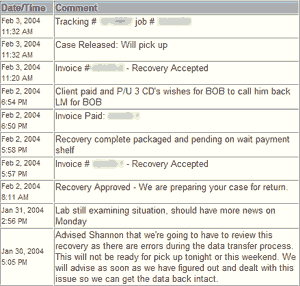I'm still building a new master drive; because their restore was incomplete, I have to merge several sets of backups with the restored files in order to generate a complete step. That should take me until about noon. Then I'll do a few test update steps, put up the new articles officially, update the newsfeed, auto-process for bad images, and then do an experience update.
Watching them do the restore process I thought of so many little useful utilities to speed up what they do, as well as integrating the process with their website to improve customer relations. I'm always surprised how incredibly inefficient most processes are. A few years ago I lived with a machinist who's specialty was process design for tooling; he had similar comments about his industry.
Anyway, point is, everywhere you look there are interesting and profitable businesses waiting to be started. Of course, that also ignores the pending economic crash in the United States… After all, at this point the US is a failed economy that's supported almost entirely by a foreign slave trade.

I've been thinking a lot about George Bush's tax cuts, and the more I think about them, the more I think I might understand them. Because they're weird. Given the financial bashing that the poor and middle classes are getting right now, it's somewhat reckless politicially. Now, I have argued in the past that he doesn't care because the poor people's vote doesn't count anyway, and when they do vote, they vote like they're told. However, I'm not sure that's the whole story.
One of the things that makes America unique (or at least a “leader”) among Western Nations is that it has a disturbingly low rate of savings (ie. people don't have money in the bank). When you talk to traditional economists, this is something that worries them much more than Bush's deficit. It basically means that you either have to face monstrous and total financial collapse from an economic hiccup that you have no shield against, or you have to run a pyramid system (ie. use poor countries for cheap labor and so on).
Clearly a pyramid system eventually fails — we're already seeing that. The US knows it has to be able to pull out of that game if the world really goes to war (or the slave-countries climb out of that work camp). Thus, the US government must improve the savings of American civilians. One economic group consistently saves money — the wealthy. It's how they stay wealthy. They shelter and protect their wealth. Now, that's bad, because it keeps it out of the economy, but it's also good because it provides a much needed buffer as well. If you look at Bush's budget, he's also introduced tax cuts for anyone (in any demographic group) that puts away long-term savings (I guess because introducing a living wage is too much to ask).
I wonder this about a lot of the US's bizarre actions lately:
are they acts of desperation, rather than acts of greed?











